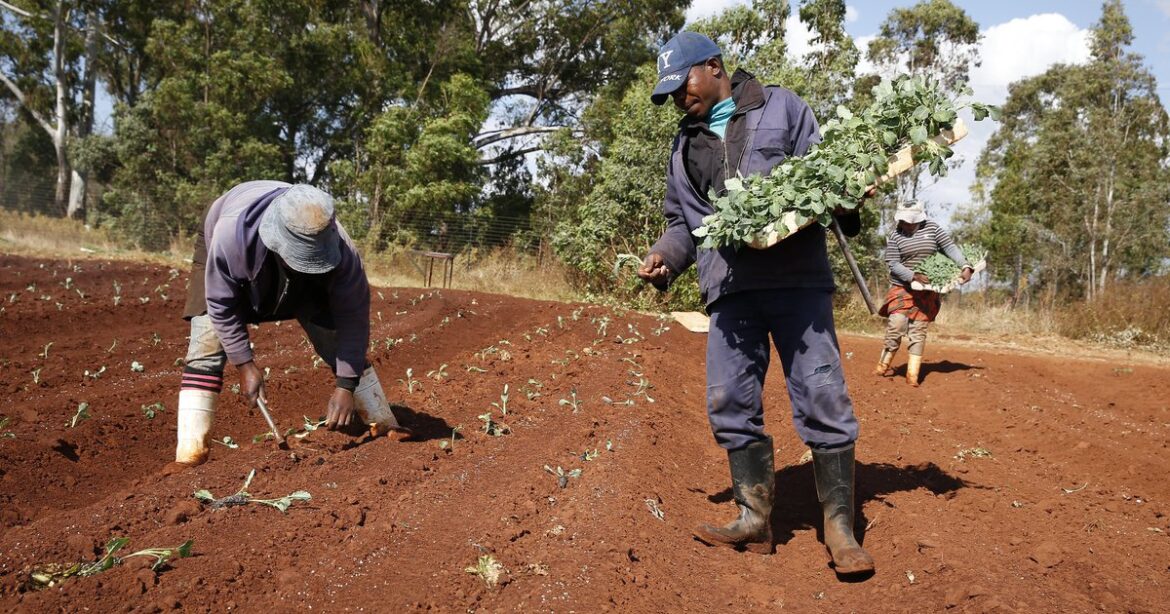Agribusiness in Africa is often championed as a driver of economic growth, food security and rural development.
Côte d’Ivoire is the world’s largest producer and exporter of cocoa, while Nigeria ranks as the fifth-largest producer of palm oil globally; both sectors are major sources of income for local farmers and play a vital role in sustaining livelihoods. Yet behind the vast, green agricultural fields, another reality exists: one marked by labour rights abuses, land conflicts, environmental degradation and broader human rights violations.
Local communities are facing serious risks from agribusiness activities – and finding themselves on the receiving end of threats or intimidation when they attempt to speak out against harmful business activity. Over the years, Luxembourg-based company Socfin and its subsidiaries have faced repeated allegations of land rights violations, lack of free, prior, and informed consent, sexual harassment, environmental damage, suppression of peaceful protest, and threats and intimidation in several African countries, including Cameroon, Ghana, Nigeria, Ivory Coast and Sierra Leone. An internal investigation by the company in 2023 confirmed evidence of sexual harassment, land grabs, environmental degradation and water pollution involving its subsidiaries Socfin Agricultural Company (SAC) in Sierra Leone and SAFACAM in Cameroon.
Similarly, in Senegal, African Agriculture, a US-based company cultivating alfalfa, has been accused of depleting and polluting Lake Guiers to irrigate its crops, allegedly harming nearby communities’ rights to water and health. The company has strongly denied these claims. These instances highlight the significant social, economic, cultural and health risks that host communities often bear when large-scale agricultural projects are developed without rigorous environmental and human rights standards.
Meanwhile, in Kenya’s tea sector, workers reportedly frequently endure unfair working conditions and occupational health and safety issues – often due to inadequate protective equipment, unfair wages and harassment, including sexual harassment. Global supply chains, particularly in cocoa and tobacco farming, have been linked to child labour and forced labour in Africa. According to research by the Business & Human Rights Resource Centre, workforce protections in global agribusiness supply chains remain weak, particularly when it comes to preventing forced labour, which remains a persistent and serious risk in the sector.
Migrant workers are also bearing the brunt of abuses in the sector – both within and outside Africa. The Resource Centre’s 2025 analysis on allegations of abuse against migrant workers in global supply chains identified agribusiness as the sector most frequently linked to such violations. More than 200 cases were recorded, including nine cases across the globe impacting migrant workers from 10 African countries. African migrant workers are particularly vulnerable to exploitation, including forced labour, underpayment, poor working conditions and racial discrimination. According to the UN Environment Programme, agribusiness companies are expected to manage operational risks to workers’ and communities’ rights by following international sustainability frameworks, such as the IFC’s Good Practice Handbook: Assessing and Managing Environmental and Social Risks in an Agro-Commodity Supply Chain, the ILO’s ‘Policy guidelines for the promotion of decent work in the agri-food sector’, the OECD‑FAO Guidance for Responsible Agricultural Supply Chains and the UNGPs, among others.
While states have the duty to protect human rights, businesses – regardless of their size and sector – have a responsibility to uphold them. This includes ensuring decent working conditions, engaging in meaningful dialogue and inclusion, conducting effective human rights due diligence, and providing effective remedy for affected workers and communities throughout their value chains. However, many agribusiness corporations operating in Africa or employing a workforce from Africa continue to fall short in delivering on these responsibilities, leaving workers and communities exposed to serious abuses and without effective channels to raise grievances or seek redress .
In the midst of these widespread human rights abuses, several governments across Africa have begun taking meaningful steps to promote more sustainable and responsible agribusiness practices. New laws, enhanced monitoring and targeted initiatives aim to strengthen due diligence, enhance community participation and ensure that industrial agriculture contributes to fair and inclusive development.
Without enforceable standards, true community engagement and strong accountability, we have seen how large-scale agriculture projects can deepen injustices and human rights abuses. To prevent this, companies must take concrete steps to protect the rights of workers and communities throughout their supply chains. This must include ensuring decent work and fair wages, strengthening health and safety protections, eradicating forced and child labour, reinforcing social security, supporting trade unions and collective bargaining, and integrating gender policies where needed.
Finally, it is crucial that companies engage in meaningful dialogue and informed participation with communities, while also maintaining transparent and independent grievance mechanisms, enforcing zero-tolerance policies for threats or violence, and paying special attention to women’s rights and access to land. This must be achieved through the urgent enforcement of international standards for human rights and environmental due diligence, encompassing principles of responsible business conduct, genuine community participation, and robust grievance mechanisms to ensure that this growth does not come at the expense of local communities’ rights and livelihoods.
While agribusiness has a real potential to drive economic growth across the continent, this potential should never come at the expense of fundamental human rights or the environment.


WACOCA: People, Life, Style.